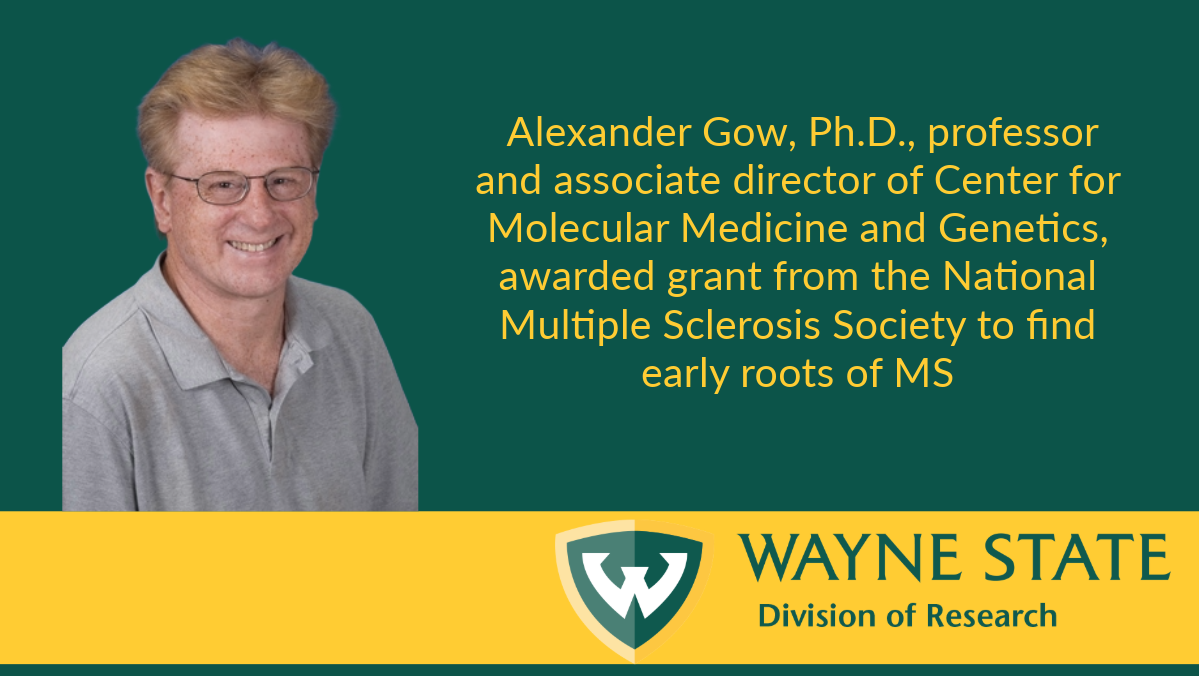Wayne State researcher receives grant from the National Multiple Sclerosis Society to explore new causes of MS

DETROIT — Alexander Gow, Ph.D., professor and associate director of the Center for Molecular Medicine and Genetics and professor of pediatrics and neurology at the Wayne State University School of Medicine, received an award from the National Multiple Sclerosis Society for a study into the causes of multiple sclerosis.
The three-year, $644,827 grant for his study, “Metabolic Stress and Oligodendrocyte Pathophysiology,” will explore the early roots of Multiple Sclerosis (MS) in patients that Gow believes may begin years — perhaps even decades — before symptoms become apparent.
Gow is studying the disease’s effects on oligodendrocytes — a type of neuroglia whose main functions are to provide support and insulation to axons within the central nervous system — that may provide new insight on the development and origins of MS within patients.
“MS is commonly defined as a primary autoimmune disease,” said Gow. “However, at diagnosis, many patients show previous disease activity in MRI scans (asymptomatic). Thus, disease begins long before diagnosis (years, perhaps a decade or two) so no one knows how it starts. Maybe it is autoimmune, but maybe something else leads to autoimmunity. This broader perspective of MS is central to us. We know of disease processes in oligodendrocytes from MS patients that are not directly linked to autoimmunity. Could these processes contribute to disease? That is our question.”
Gow will focus on processes involved with oligodendrocyte metabolism and how it may cause a type of damaging stress in the cells. This stress can also be associated indirectly to the activation of inflammatory cells in the brain and, by looking at MS from this new perspective, Gow and his team may develop improved treatments for the disease.
“We have identified a protein in oligodendrocytes, called Trb3, that might be a good drug target for this,” said Gow. “In this project we will test whether Trb3 can reduce disease in oligodendrocyte. We will also characterize two other proteins that interact with Trb3 because they are known to control metabolism in cells.”
“Dr. Gow’s research is an excellent example of how Wayne State University is playing a vital role in the health of Detroiters and people around the world,” said Ezemenari Obasi, Ph.D., vice president for research at Wayne State University. “Dr. Gow’s important work has the potential to provide new insight into a disease that affects nearly one million people in the United States.”
# # #
Wayne State University is one of the nation's pre-eminent public research institutions in an urban setting. Through its multidisciplinary approach to research and education, and its ongoing collaboration with government, industry and other institutions, the university seeks to enhance economic growth and improve the quality of life in the city of Detroit, the state of Michigan and throughout the world. For more information about research at Wayne State University, visit research.wayne.edu.
Contact info
Julie O'Connor
Director, Research Communications
Phone: 313-577-8845
Email: julie.oconnor@wayne.edu